Overview
A leading logistics software development company is characterized by key features such as:
- Real-time tracking
- Inventory management
- Integration capabilities
These elements collectively enhance operational efficiency and service delivery, positioning the company as an industry leader. It is essential to recognize that these features are not merely beneficial; they are critical for addressing the multifaceted challenges faced by transportation firms. By enabling better decision-making, improving customer satisfaction, and streamlining processes, these capabilities empower companies to thrive in an increasingly competitive landscape. Thus, investing in robust logistics software is not just a choice; it is a necessity for those aiming to excel in the industry.
Introduction
In today's increasingly complex global market, logistics software development stands as a pivotal component for businesses striving to enhance operational efficiency and customer satisfaction. As companies navigate challenges such as supply chain disruptions and the pressing demand for real-time visibility, grasping the key features of leading logistics software becomes essential. What specific capabilities can logistics software provide to not only streamline operations but also cultivate a competitive advantage in the ever-evolving landscape of transportation and supply chain management?
SDA: Custom Software Development for Logistics Solutions
SDA stands as a leader in logistics software development company, specifically designed for supply chain solutions, with a strong emphasis on operational efficiency and user experience. By harnessing advanced technologies and a user-focused design approach, SDA effectively addresses critical challenges faced by transportation firms, including:
- Real-time tracking
- Inventory management
- Supply chain enhancement
This tailored approach not only but also elevates service delivery, making SDA a key logistics software development company in the supply chain industry.
Recent trends reveal that companies implementing supply chain software have experienced a remarkable 30% increase in operational efficiency, highlighting the significance of customized solutions in today’s competitive landscape. Furthermore, with 90% of supply chain leaders acknowledging that big data enhances decision-making, the integration of advanced analytics into transportation software has become essential. Successful initiatives, such as DHL's AI-driven supply chain implementations, which forecast a 30% average cost reduction, exemplify the transformative potential of bespoke software solutions. As the supply chain sector continues to evolve, SDA remains committed to delivering innovative solutions that empower businesses to thrive.
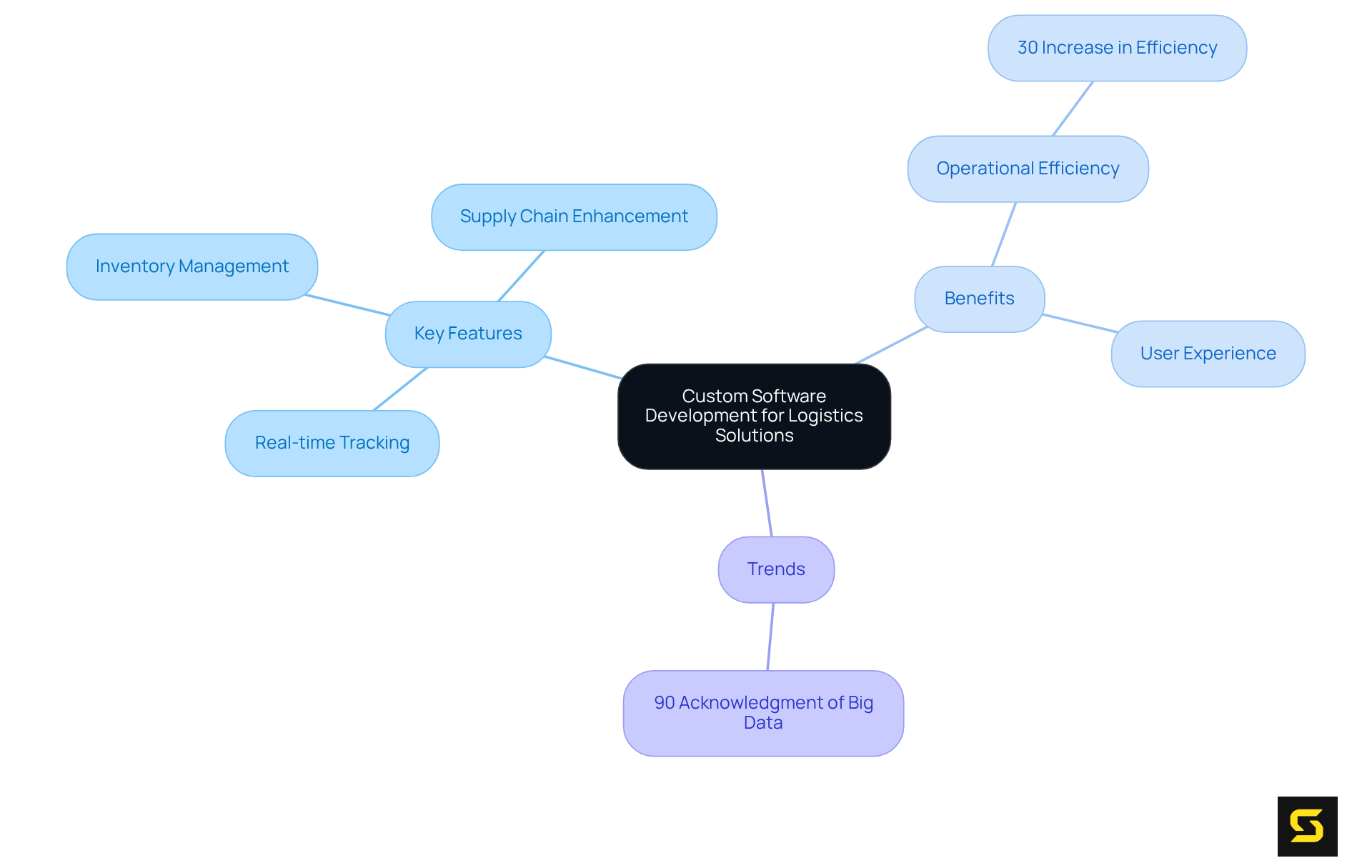
Real-time Supply Chain Visibility: Essential for Efficient Logistics Management
Real-time supply chain visibility is not just beneficial; it is essential for the efficient management of operations. This capability empowers businesses to continuously , enabling delivery service providers to swiftly tackle disruptions, optimize routes, and significantly improve customer satisfaction.
For example, a prominent truck transportation firm that adopted a custom delivery management system, as detailed in the case study "Achieving Up To 40% Improvement In Courier Efficiency Through Enhanced Supply Chain Visibility," experienced a remarkable 20-40% rise in courier efficiency through the utilization of real-time data, processing over 3 million transactions daily.
By incorporating real-time tracking systems, businesses gain practical insights that lead to enhanced decision-making and operational effectiveness. Organizations that prioritize visibility are more likely to retain customers, as transparency fosters trust and reliability.
In light of the 30% increase in supply chain disruptions in early 2024, with over 10,000 recorded incidents—including factory fires, labor strikes, and cyberattacks—the necessity for real-time tracking has never been more crucial. This capability allows businesses to manage risks and adapt to market demands effectively.
Furthermore, enhanced transparency can yield savings of up to 20% and a 5% reduction in shipping durations, underscoring the critical importance of real-time tracking systems in today’s transportation environment.
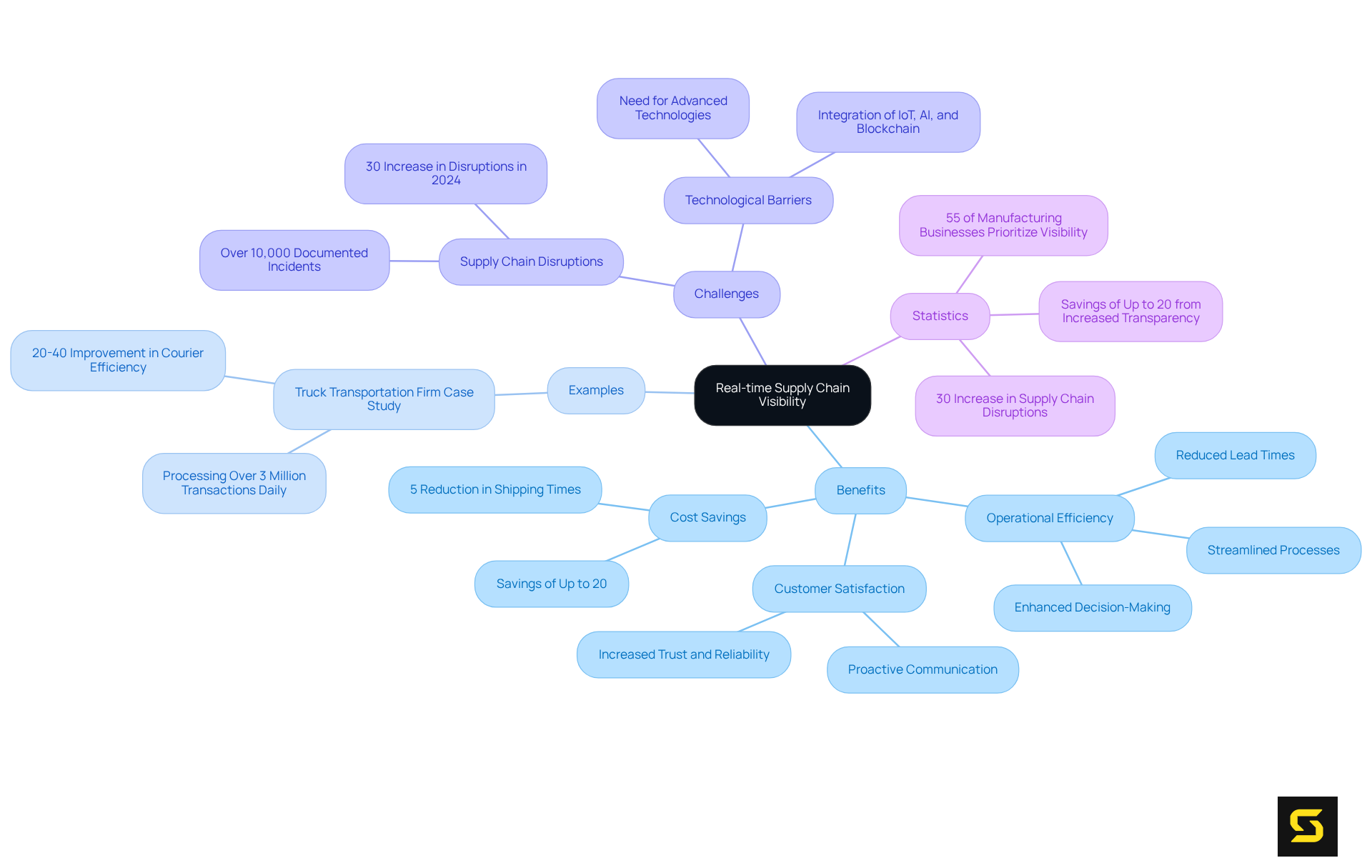
Flexible Billing Management: Adapting to Diverse Client Needs
Customizable billing management systems empower businesses in the transportation sector to meet the diverse needs of their clients by providing flexible payment options and varied invoicing methods. This adaptability not only enhances client satisfaction but also streamlines financial processes within the organization.
For instance, delivery service providers that adopt customized billing solutions can significantly elevate their service offerings, resulting in improved client retention and loyalty. As the supply chain sector evolves, the importance of such solutions becomes increasingly apparent, with organizations recognizing that efficient billing methods are vital for maintaining strong connections with clients and ensuring operational effectiveness.
With the global transportation market projected to reach $6.5 trillion by 2023, the demand for is more critical than ever. Furthermore, 83% of organizations believe that supply chains enhance customer experience, underscoring the necessity for transportation firms to implement customizable billing solutions to elevate client satisfaction.
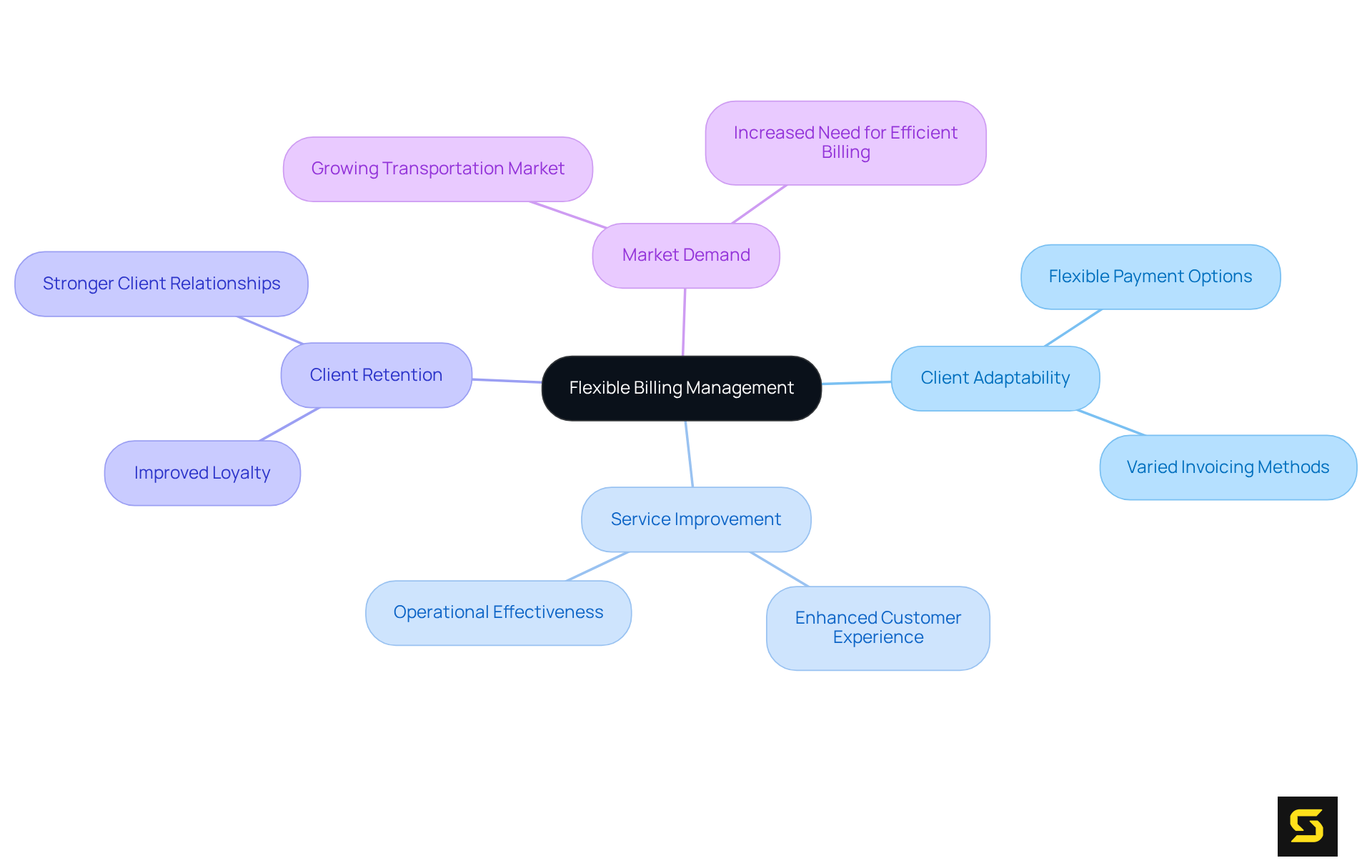
Forecasting Tools: Enhancing Operational Efficiency
Forecasting tools are indispensable for elevating operational efficiency within transportation firms. By leveraging historical data and scrutinizing market trends, these tools enable businesses to accurately predict demand, a crucial factor for effective stock management and resource allocation.
For example, companies employing machine learning for demand forecasting have achieved a remarkable 90% accuracy, compared to just 60% with traditional manual methods, significantly enhancing stock availability and reducing waste. This capability not only lowers costs but also improves service levels, fostering overall business growth.
Notable logistics leaders such as Amazon and Walmart exemplify this strategy; Amazon's AI-driven approach has resulted in expedited delivery times and heightened customer satisfaction, while Walmart's AI-powered techniques have substantially boosted stock availability, ensuring that sought-after items remain consistently on shelves.
Thus, the adoption of robust forecasting solutions emerges as a , as AI-enhanced supply chain coordination has improved transportation costs by 15%, inventory levels by 35%, and service standards by 65%. This empowers organizations to swiftly adapt to market fluctuations and sustain a competitive edge.
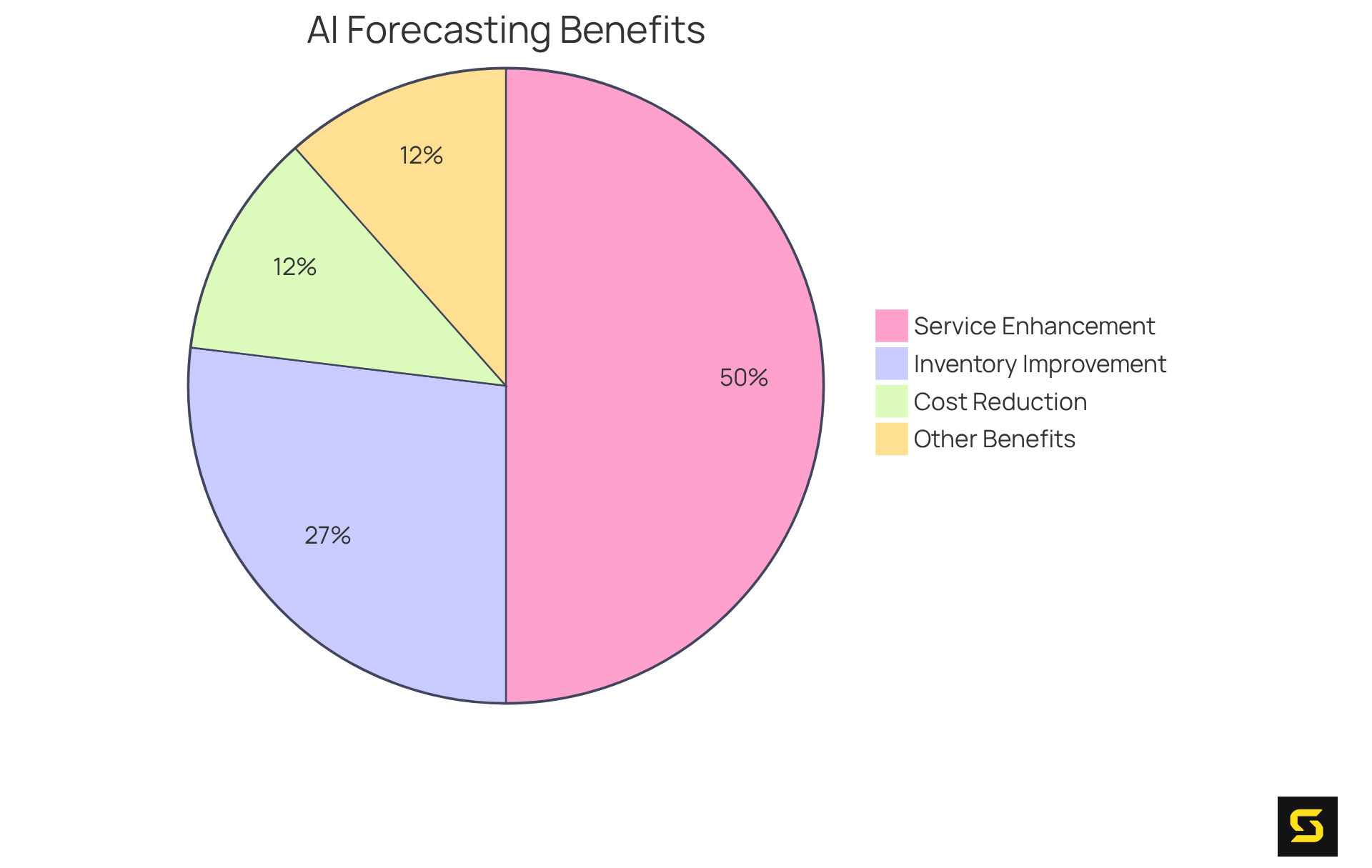
Transportation Tools: Streamlining Route Management
Transportation tools are indispensable for optimizing route management in supply chain operations. These tools empower delivery firms to significantly enhance route efficiency, reduce fuel consumption, and accelerate delivery times. By leveraging advanced algorithms and real-time data, transportation tools enable service providers to elevate their operational efficiency and meet customer expectations with precision.
In a competitive landscape, the effective use of these tools is not just advantageous; it is essential for success. Embrace the potential of transportation tools to transform your delivery operations and set a new standard in service excellence.
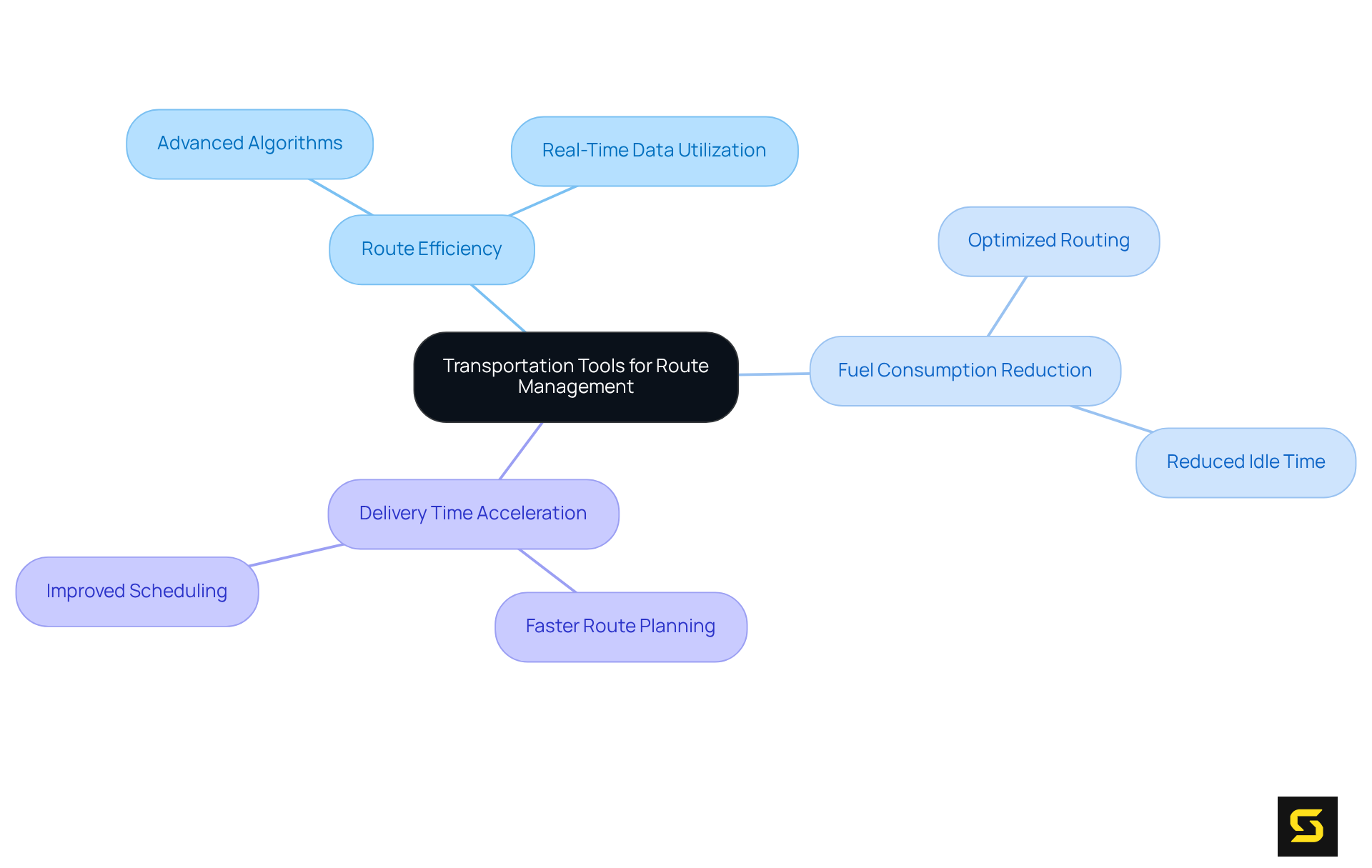
Supply Chain Analytics: Driving Data-Driven Decisions
Supply chain analytics serves as a formidable tool, empowering transportation companies to leverage that deliver critical insights into operational performance and market dynamics. By tapping into data from a multitude of sources, supply chain providers can identify inefficiencies, accurately forecast demand, and streamline their processes.
Organizations that have embraced predictive analytics, for example, have reported as much as a 30% reduction in demand variation, significantly enhancing their responsiveness to market fluctuations. Furthermore, predictive analytics can improve inventory turnover rates by up to 25%, underscoring its vital role in supply chain operations.
Companies that utilize advanced analytics have realized extraordinary operational enhancements, achieving a 94% on-time delivery rate—up from 80%—by refining their management control systems. This remarkable improvement stemmed from establishing clearer roles and responsibilities and implementing defined KPIs.
The integration of robust analytics solutions not only elevates operational efficiency but also confers a competitive edge in an increasingly complex market landscape. As transportation firms increasingly adopt data-driven strategies, they position themselves to swiftly adapt to evolving demands and optimize overall performance.
As Erica Mejia, an industrial engineer at Crowley, emphasizes, harnessing data-driven supply chain management empowers professionals to make superior decisions, further illustrating the transformative potential of analytics within the sector.
However, vigilance regarding cybersecurity threats remains essential, as these pose significant challenges to supply chain resilience. Additionally, the incorporation of sustainability into supply chain oversight is gaining prominence, reflecting the growing emphasis on environmental considerations in transportation.
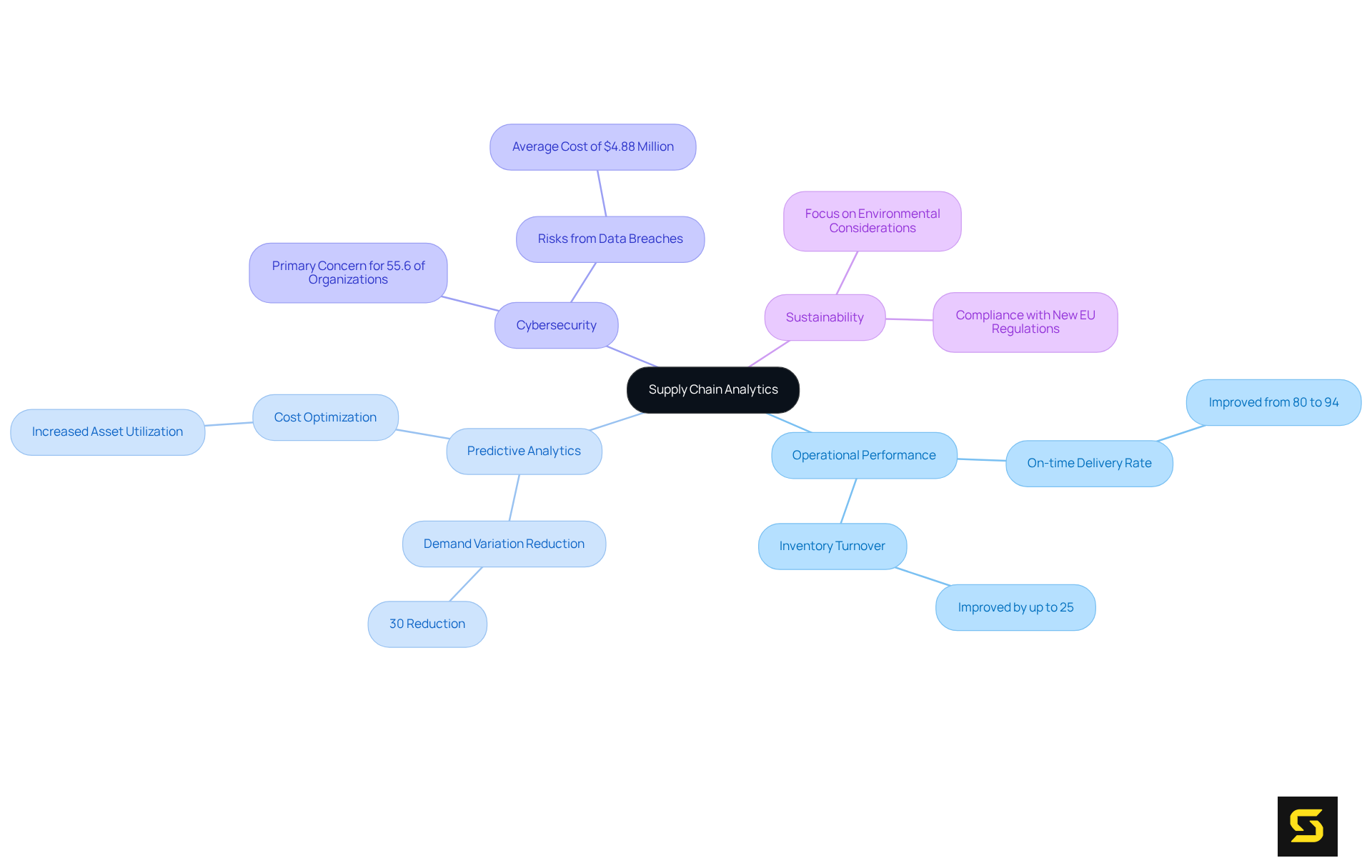
Order Management Systems: Ensuring Seamless Order Tracking
Order management systems (OMS) are essential for ensuring seamless order tracking from placement to delivery. These systems empower delivery firms to effectively monitor order status, , and fulfill customer requests. By adopting a robust OMS, service providers not only enhance customer satisfaction but also streamline their operations, resulting in improved service delivery. Implementing an effective OMS is not just beneficial—it's imperative for any organization aiming to maintain a competitive edge in today's fast-paced market.
![]()
Inventory Management Systems: Optimizing Stock Levels
Efficient stock management systems are indispensable for logistics firms aiming to optimize stock levels and meet customer demand without incurring unnecessary expenses. These systems provide real-time insights into stock levels, empowering companies to make data-driven decisions regarding restocking and resource allocation. For instance, a leading non-alcoholic beverage company has successfully utilized TransitionWorks for real-time barcode data collection, significantly improving stock accuracy and enhancing customer service. This initiative has resulted in a remarkable increase in , soaring from 80% to 94%.
Moreover, demand forecasting is pivotal in stock optimization, allowing businesses to anticipate customer needs and minimize excess inventory. This proactive strategy not only lowers carrying costs but also boosts operational efficiency. A global consumer packaging leader, with annual sales around $2.7 billion, has adopted advanced inventory optimization techniques, including:
- Dynamic replenishment
- Safety stock management
These strategies have led to a 90% fulfillment rate, coupled with enhanced performance monitoring.
The importance of optimizing stock levels cannot be overstated, as it directly influences an organization's ability to fulfill orders promptly and maintain customer satisfaction. By leveraging real-time visibility and fostering robust communication with supply chain partners, service providers can allocate resources more efficiently, streamline operations, and ultimately drive business growth. Continuous improvement in stock management practices, supported by effective oversight control systems, ensures that transportation firms remain agile in response to market changes and technological advancements.
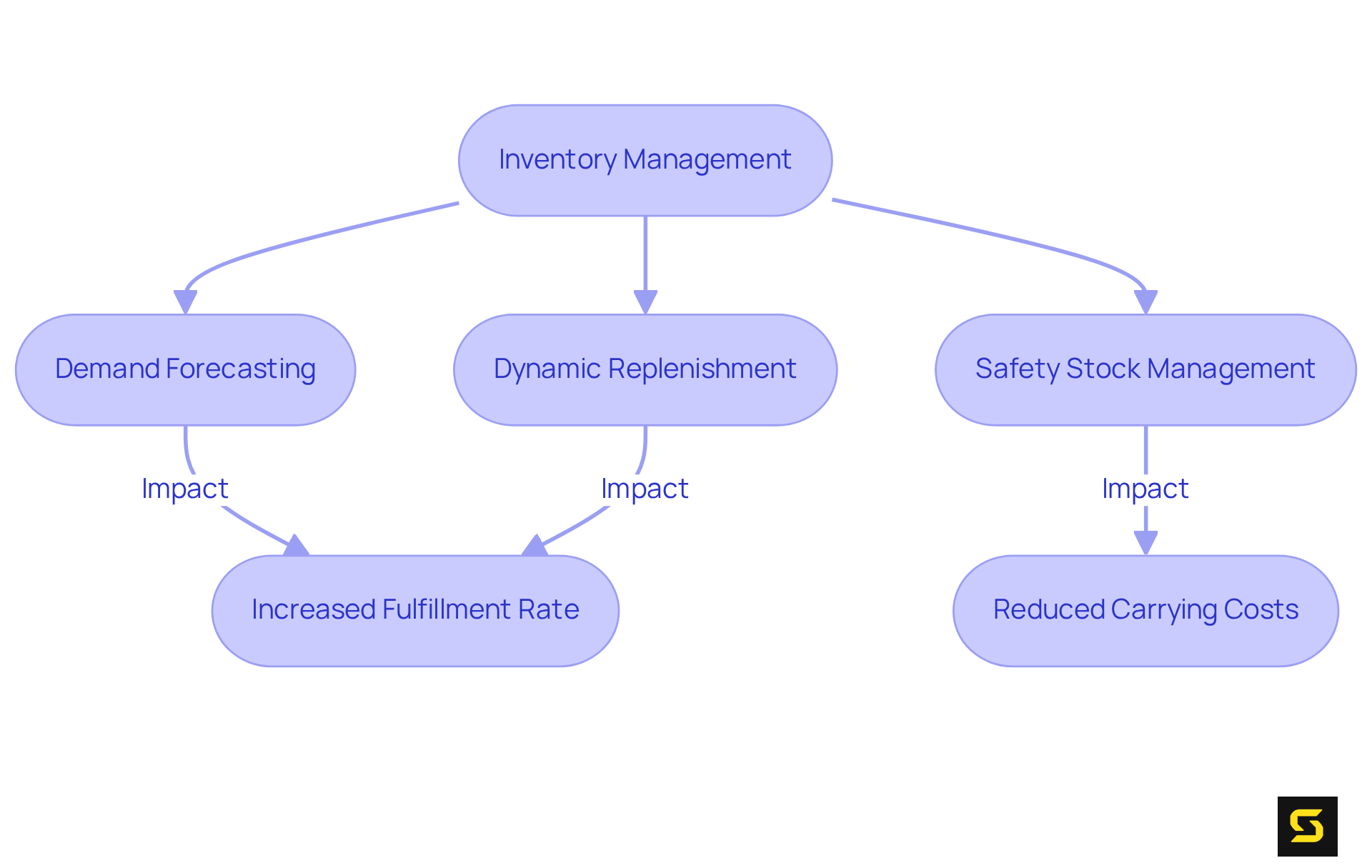
Warehouse Management Systems: Improving Operational Efficiency
Warehouse control systems (WCS) are indispensable for within supply chain activities. These systems automate critical warehouse processes such as:
- Inventory tracking
- Order fulfillment
- Shipping management
By adopting a robust warehouse management system (WMS), businesses in the transportation sector can significantly boost productivity, minimize errors, and streamline their operations. This strategic enhancement ultimately leads to superior service delivery and substantial cost savings. Embrace the power of WCS to transform your operations and gain a competitive edge in the marketplace.
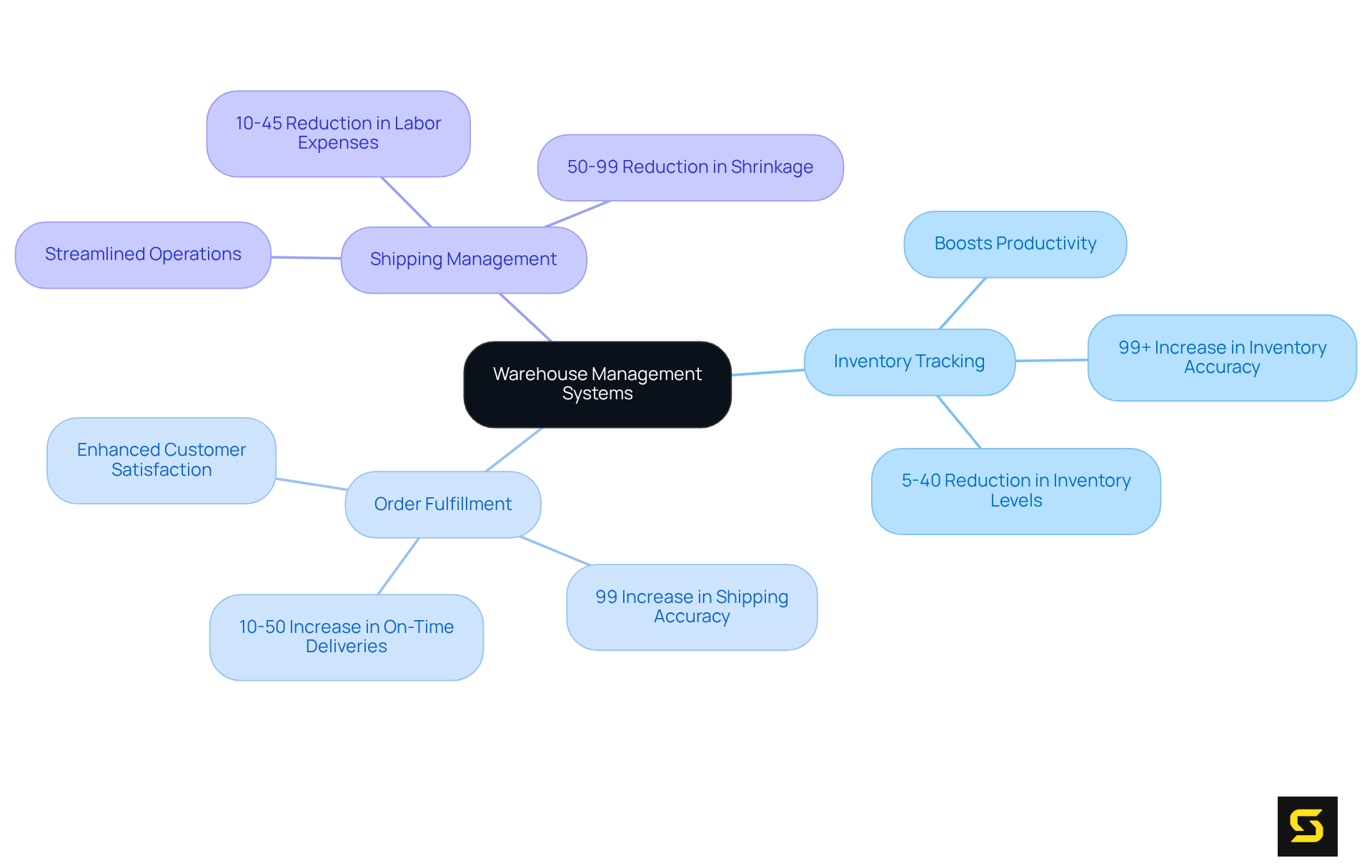
Integration Capabilities: Ensuring Seamless Operations Across Platforms
Integration capabilities are crucial for ensuring across diverse supply chain platforms. By facilitating effective communication and data sharing among various systems, transportation firms can significantly enhance operational efficiency and mitigate the risk of errors. A logistics software development company provides robust integration solutions that empower logistics providers to streamline their processes, improve data accuracy, and ultimately deliver superior service to their clients. As the industry evolves, investing in these capabilities is not merely beneficial but essential for maintaining a competitive edge.
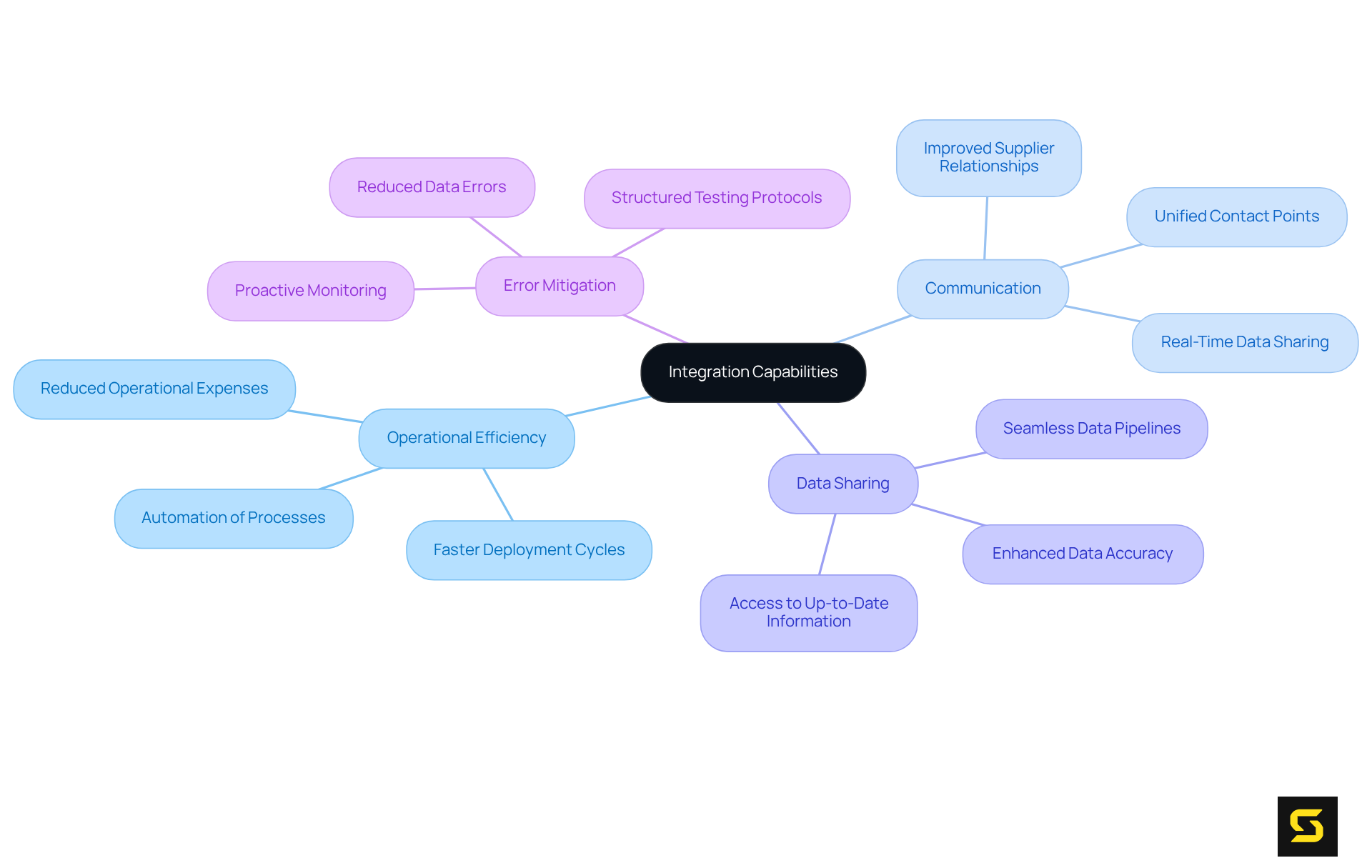
Conclusion
SDA exemplifies the pivotal role of leading logistics software development companies by offering tailored solutions that enhance operational efficiency, improve user experience, and address the unique challenges faced by transportation firms. The emphasis on custom software development is not merely a trend but a necessity for organizations looking to thrive in a competitive landscape.
Key features such as:
- Real-time tracking
- Flexible billing management
- Advanced forecasting tools
- Integration capabilities
are essential components of effective logistics management. Each feature significantly contributes to operational efficiency, customer satisfaction, and cost reduction, demonstrating the transformative potential of bespoke logistics software solutions. Companies that adopt these technologies not only gain a competitive edge but also position themselves for sustainable growth in an ever-evolving market.
The importance of investing in logistics software development cannot be overstated. As the industry continues to face challenges such as supply chain disruptions and increasing customer expectations, leveraging advanced technologies and customized solutions will be crucial. Organizations must prioritize these key features to enhance their operations, foster client loyalty, and ultimately drive success in the logistics sector. Embracing innovation and adaptability will ensure that businesses remain resilient and competitive in the future.
Frequently Asked Questions
What is SDA and what does it specialize in?
SDA is a leader in logistics software development, specifically designed for supply chain solutions, focusing on operational efficiency and user experience.
What critical challenges does SDA address for transportation firms?
SDA addresses challenges such as real-time tracking, inventory management, and supply chain enhancement.
How does customized software impact operational efficiency in the supply chain?
Companies implementing supply chain software have seen a 30% increase in operational efficiency, demonstrating the importance of customized solutions.
What role does big data play in supply chain decision-making?
90% of supply chain leaders acknowledge that big data enhances decision-making, making the integration of advanced analytics essential in transportation software.
Can you provide an example of successful software implementation in logistics?
DHL's AI-driven supply chain implementations forecast a 30% average cost reduction, showcasing the transformative potential of bespoke software solutions.
Why is real-time supply chain visibility important for logistics management?
Real-time visibility allows businesses to track shipments and inventory continuously, helping to optimize routes and improve customer satisfaction.
What improvements can businesses expect from incorporating real-time tracking systems?
Businesses can experience a 20-40% rise in courier efficiency and enhanced decision-making capabilities.
What are the recent trends regarding supply chain disruptions?
There has been a 30% increase in supply chain disruptions in early 2024, highlighting the necessity for real-time tracking to manage risks effectively.
How can real-time tracking impact operational costs and shipping durations?
Enhanced transparency from real-time tracking can lead to savings of up to 20% and a 5% reduction in shipping durations.
What is the significance of customizable billing management systems in the transportation sector?
Customizable billing systems allow businesses to provide flexible payment options and varied invoicing methods, enhancing client satisfaction and streamlining financial processes.
Why is efficient billing management increasingly important in the supply chain?
With the global transportation market projected to reach $6.5 trillion, efficient billing practices are critical for maintaining strong client connections and operational effectiveness.





